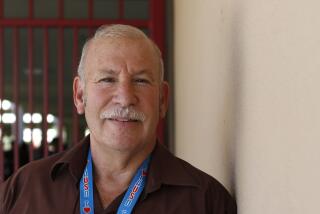UTLA needs to be progressive
As a former teacher at the school in question, I can attest that Matthew C. Taylor, who advocated in his Blowback that we should “stop cheering on charter schools,” is definitely not an expert on what ails Locke High School.
I strongly believe that unions have a place in education, but I repeatedly saw that instead of providing a history of the battles they have undertaken on behalf of teachers in Los Angeles, United Teachers Los Angeles tried to strong-arm new teachers at Locke -- telling them what they should think and how “wrong and inexperienced” they really were. Rather than disparage new teachers, training could have taken place that would have helped raise all teachers’ expectations of their students. Instead, UTLA contributed to the very problem it is complaining about, the district’s “losing” Locke to a charter system.
Rather than continue on a diatribe about charter schools versus “public schools” (despite the apparent support of charter schools by UTLA President A.J. Duffy), a reevaluation of what public schools should look like is desperately needed. The days of large comprehensive schools, often run by ineffective teachers dominated by top-down leadership, are over. Across the country, educators, politicians and scholars are all saying the same thing about public education: Smaller is better. What is wrong with moving Locke in a direction in which something positive can occur? According to the LAUSD’s own statistics, Locke has a 41% graduation rate (which seems rather high) and an approximately 67% teacher retention rate. We are already leaving children behind, continuing to lose effective and influential teachers, and we have very little active support from the public.
Still, there was some progress at Locke under the former principal and small learning communities. The school saw an increase in attendance, college acceptance and test scores -- and a reduction in violence (which has picked up this year due to a “lame duck” view of the school and its leadership). And in spite of years of low expectations from the community, the district and others, a number of recent graduates are enrolled in such prestigious universities as the Massachusetts Institute of Technology, UCLA, UC Berkeley and a host of others. School leadership under the small learning communities became more teacher-focused and less administrator-driven. This structural change helped move Locke toward a more collegial environment, with a respect among teachers that had been lacking. Teachers began working in collaboration, creating cross-disciplinary projects and lessons.
Some may ask, in a school with improving scores, improving graduation rates and a movement toward better teaching and learning, why rebuff the momentum? There was a limit to how far Locke could improve in a bureaucratic system with strong internal and external opponents. First, certain faculty members, union representatives and others sought to condemn well-performing small learning communities, and they continually circumvented the leadership of our principal, whose departure last year made things erode further. A number of school leaders and other faculty announced their resignations from Locke because of the lack of appreciation and support. Second, although school financing certainly contributed to widespread problems, the bureaucracy through which money was funneled appeared to be the bigger constraint. And finally, low-performing teachers defended and protected by the union were also major obstacles -- without the ability to relocate, retrain or remove teachers who had repeatedly proved less effective than others, Locke was destined to fail.
Rather than continue to dismiss and deride charter schools, critics of school choice need to share proposed alternatives with those of us working diligently in defense of our children’s success. When UTLA came to Locke to fight against the transformation to a charter school, its proposed alternative was to maintain the system as it was. This was not an enticing or even feasible option to many of the teachers at Locke.
For UTLA to be a substantive contributor to the debate on the future of schools in Los Angeles, the union needs a more progressive stance. Across the country, there is an escalating movement toward school choice (particularly in large urban school districts). At this critical juncture, UTLA has the unique opportunity to be a fundamental contributor toward making choice a viable and realistic option in Los Angeles in a way that meets the needs of students and teachers alike.
Stuart Rhoden is a former teacher and small-learning-communities coordinator at Locke High School, and taught for several years in Chicago. He is enrolled in graduate school in the College of Education at Temple University.
Blowback is an online forum for full-length responses to our articles, editorials and Op-Ed articles. Click here to read more about Blowback, or submit your own by e-mailing us at opinionla@latimes.com.
More to Read
A cure for the common opinion
Get thought-provoking perspectives with our weekly newsletter.
You may occasionally receive promotional content from the Los Angeles Times.






